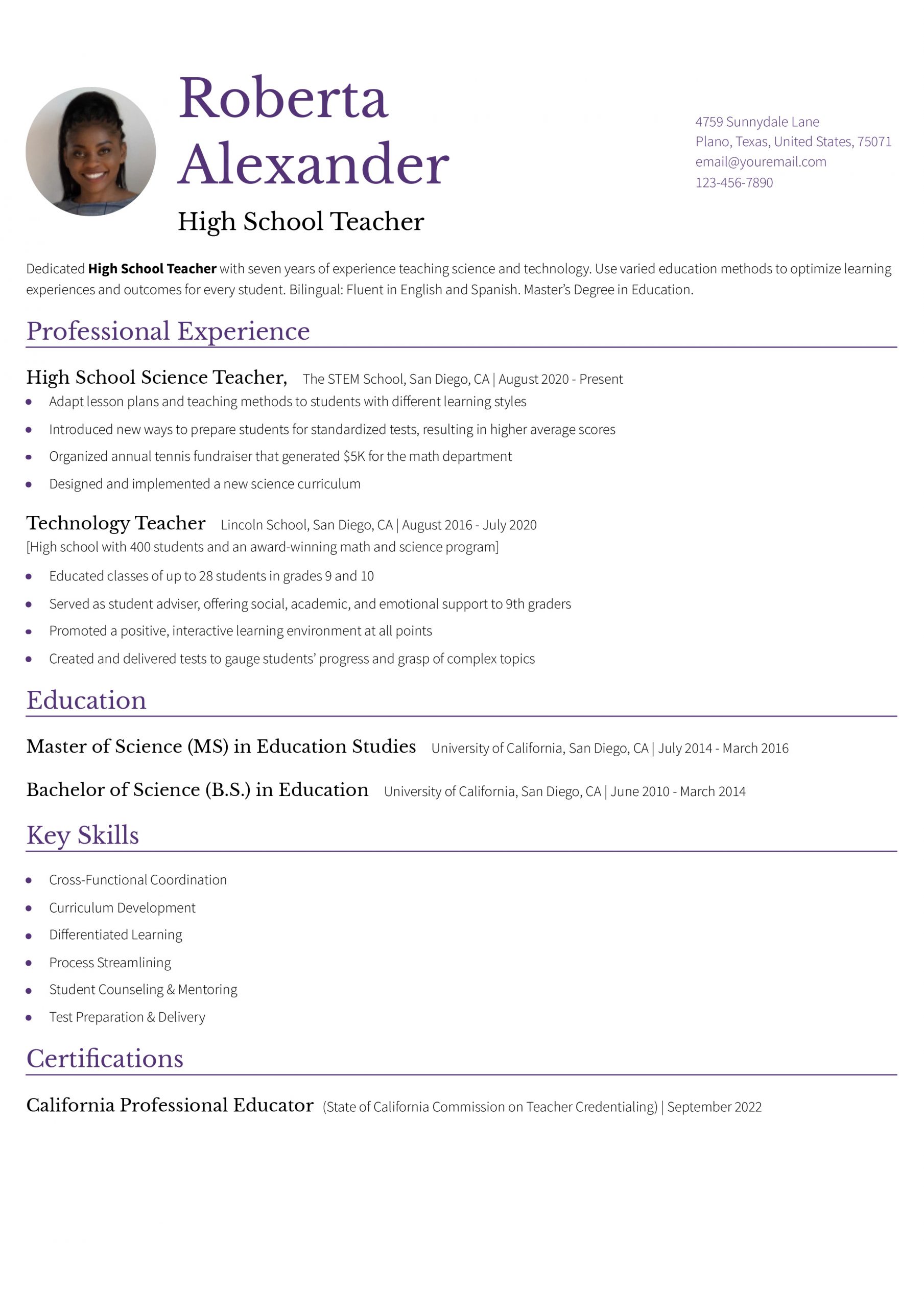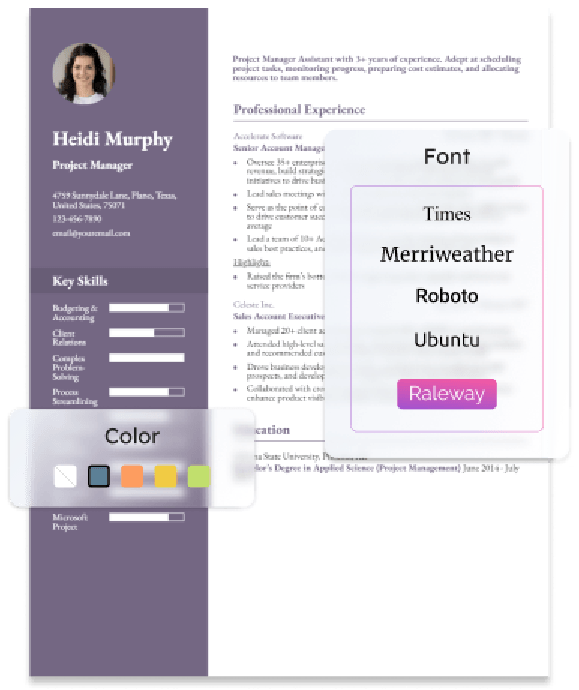Whether you’re a tenured educator or just starting your teaching career, a well-crafted resume is key to finding job opportunities. To write a good resume, you’ll need to carefully consider the unique requirements and expectations of the educational services sector. Showcase your skills in lesson planning, managing students, testing students, and more. This comprehensive guide will help you write a standout resume that shows your skills, achievements, and passion for teaching.
Most Popular Teacher Resumes
Teacher - Entry-Level Resume Example
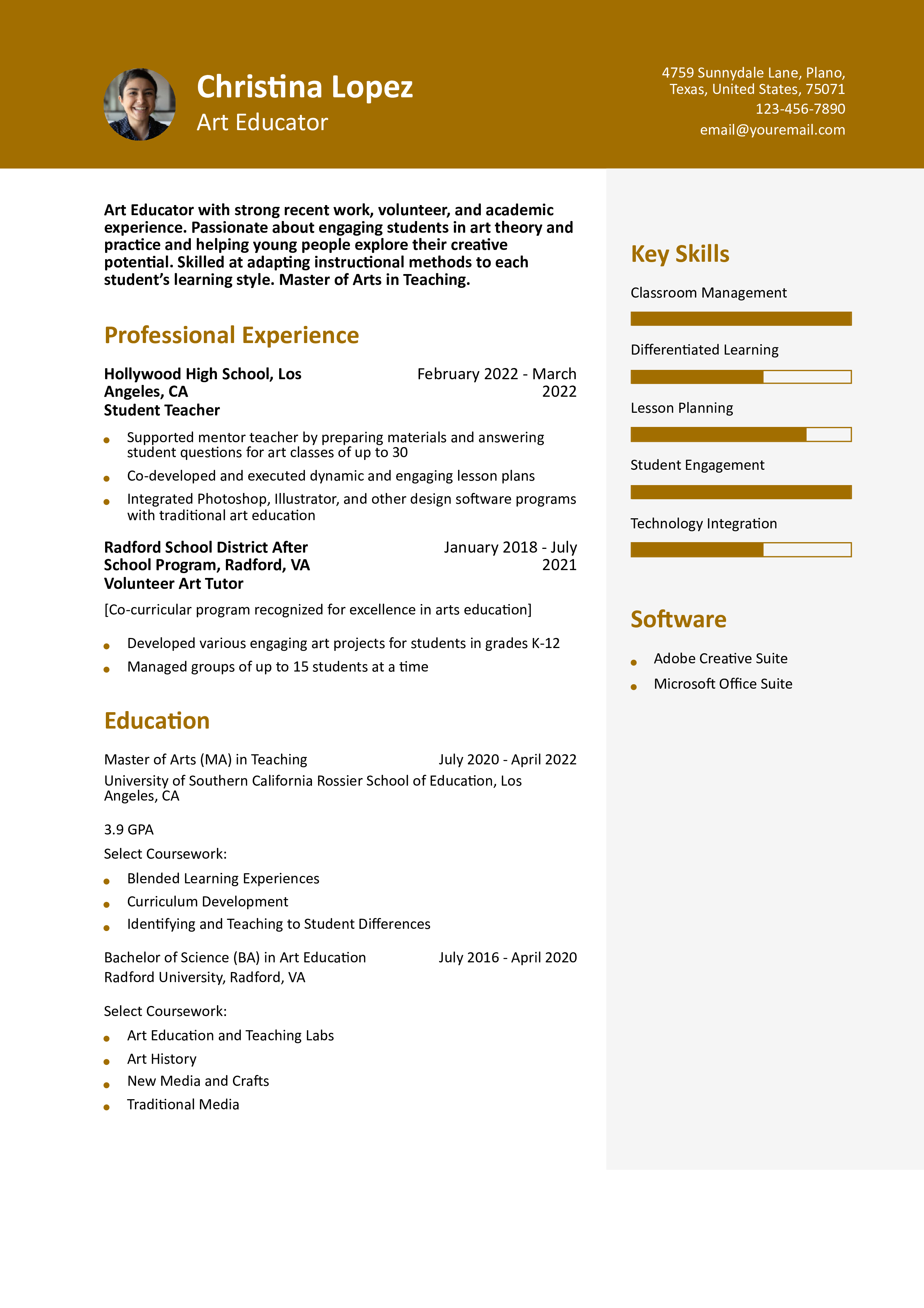
Why this resume is strong:
This resume highlights a blend of academic excellence and hands-on experience in both classroom and volunteer settings. The integration of traditional art with modern technology demonstrates a versatile approach to engaging diverse student learning styles.
Teacher - Mid-Level Resume Example
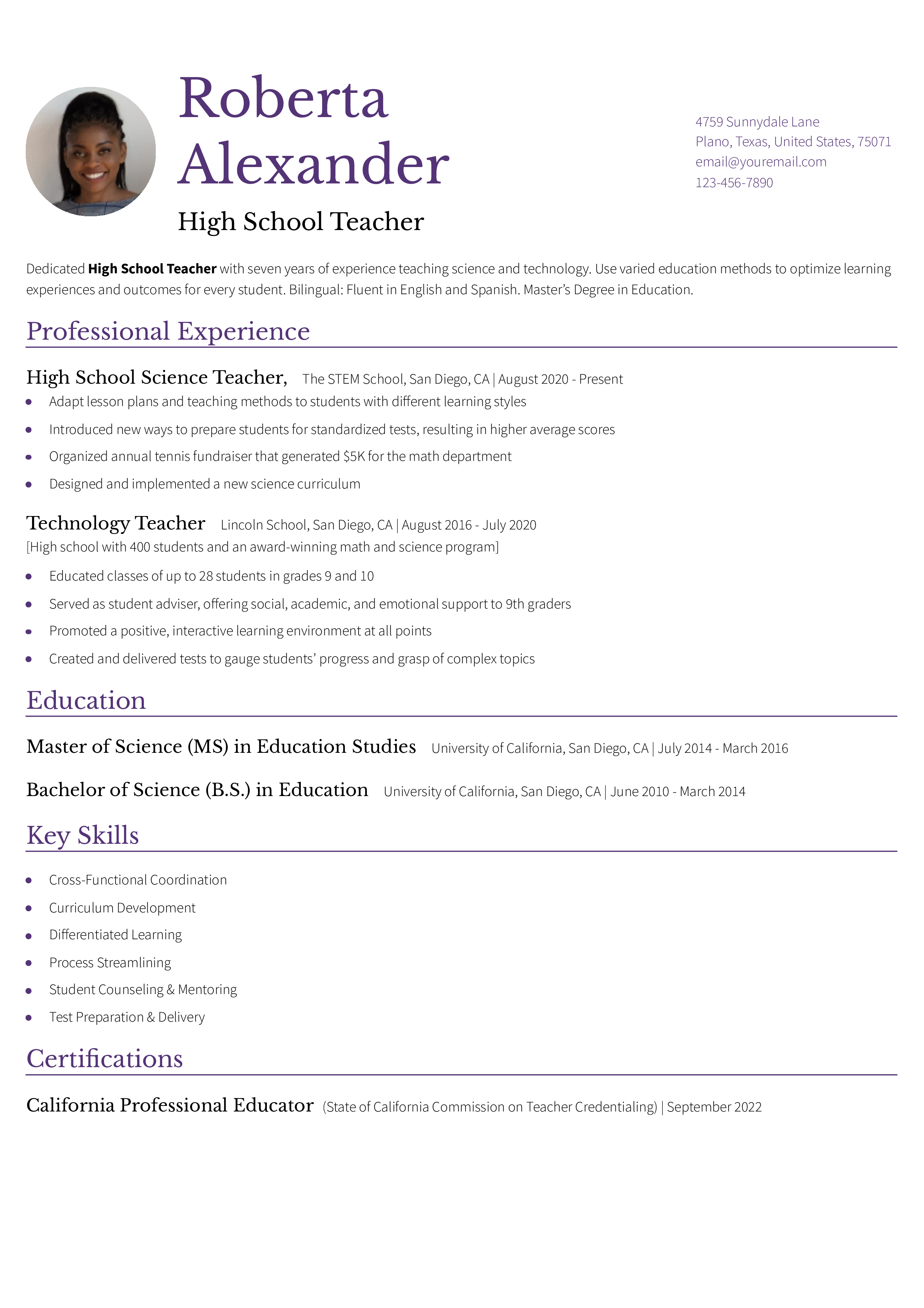
Why this resume is strong:
It emphasizes curriculum development, test preparation, and the ability to improve student outcomes. The candidate’s bilingual proficiency and experience in both science and technology education make them highly adaptable for a range of teaching environments.
Teacher - Senior-Level Resume Example
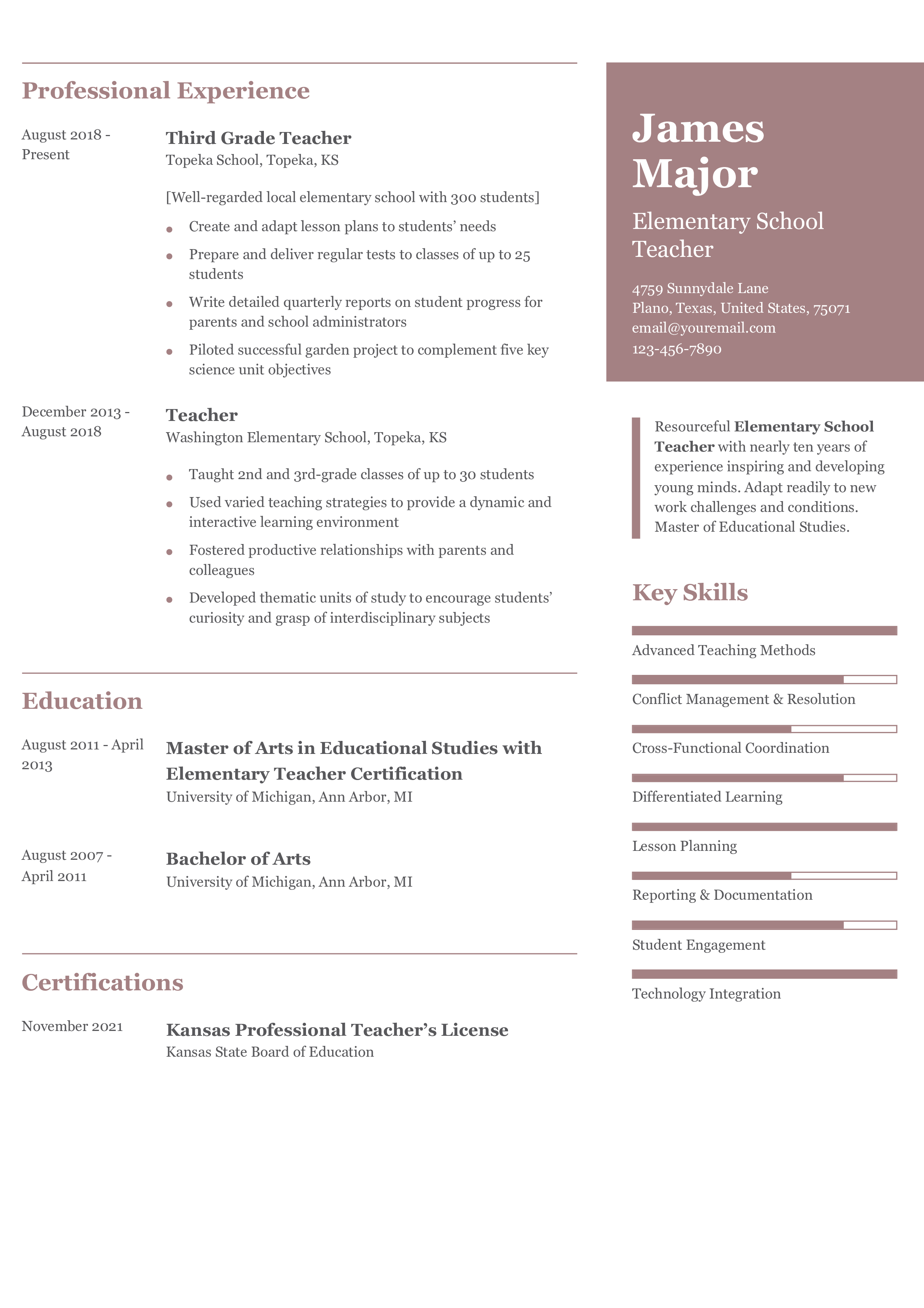
Why this resume is strong:
With nearly ten years of experience, this resume showcases strong classroom management and innovative project leadership, like the successful garden project. The focus on student engagement and individualized lesson planning highlights the teacher’s dedication to student success.
Art Teacher Resume Example
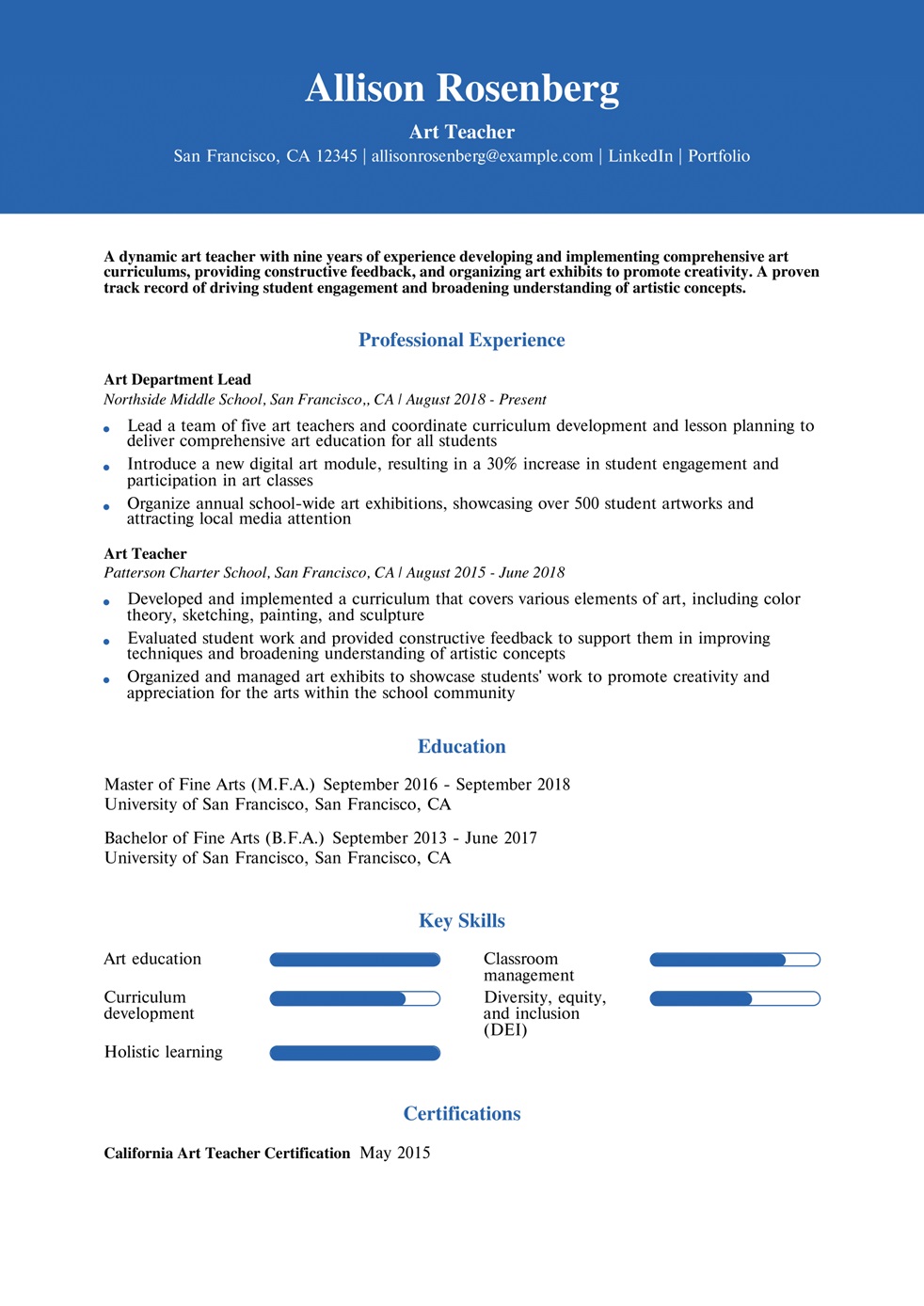
Why this art teacher resume example is strong:
This resume showcases leadership and curriculum development skills by highlighting the candidate's role as the art department lead. It also demonstrates their ability to innovate, with a focus on introducing digital art modules and organizing large-scale exhibitions. The resume effectively shows the candidate's ability to manage both students and other teachers, contributing to enhanced student engagement and creativity.
Student Teacher Resume Example
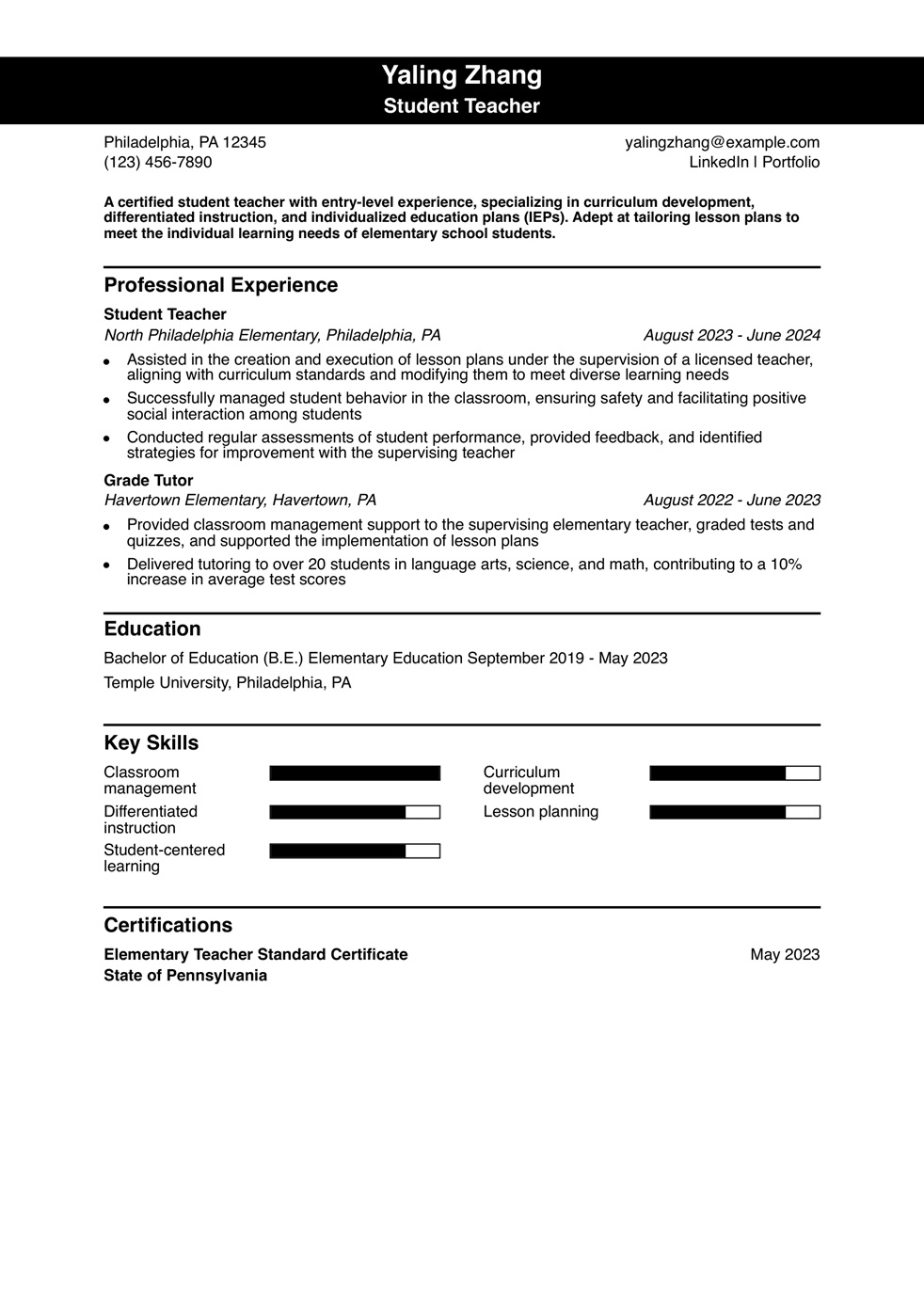
Why this student teacher resume example is strong:
This resume stands out by demonstrating the candidate's adaptability and ability to manage classroom behavior, a crucial skill for entry-level educators. It emphasizes hands-on experience in both lesson planning and tutoring, offering quantifiable results such as a 10% increase in test scores. The strong focus on individualized education plans (IEPs) and differentiated instruction adds value by showing a deep understanding of student-centered learning.
Kindergarten Teacher Resume Example
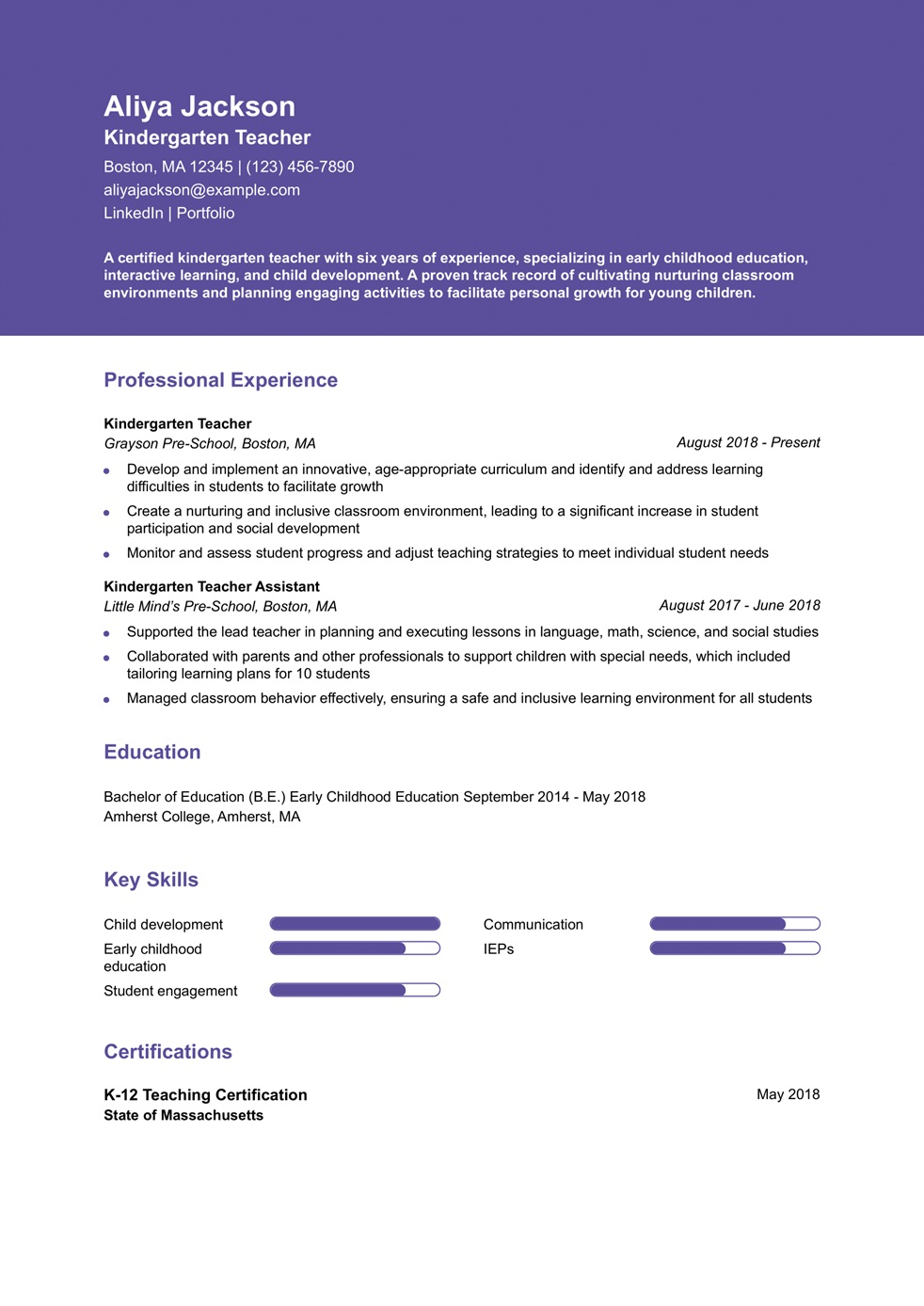
Why this kindergarten teacher resume example is strong:
This resume highlights the candidate’s ability to create a nurturing and inclusive learning environment, which is key for early childhood education. The focus on fostering student social development and identifying learning difficulties is crucial for young children. Collaboration with parents and professionals to support children with special needs adds to the resume’s strength, showing a holistic approach to education.
Math Teacher Resume Example
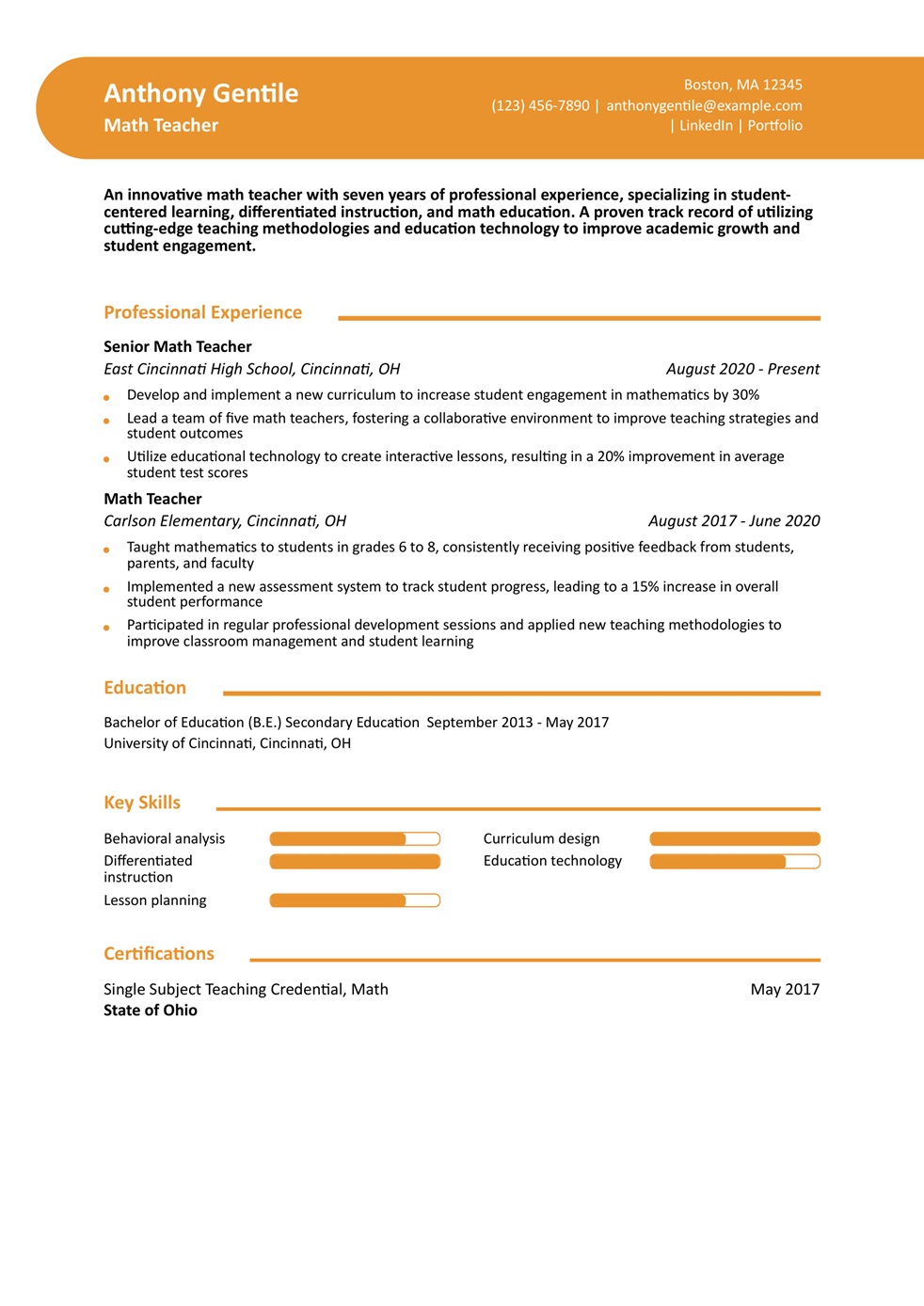
Why this math teacher resume example is strong:
This resume demonstrates the candidate's success in developing innovative curricula that increased student engagement and performance. The ability to lead and mentor a team of teachers adds a leadership dimension, while the effective use of educational technology shows adaptability in modern teaching methods. The inclusion of quantifiable outcomes, such as a 30% increase in engagement and a 20% improvement in test scores, provides evidence of impact.
Science Teacher Resume Example

Why this science teacher resume example is strong:
This resume is strong because it highlights the candidate’s ability to integrate inquiry-based learning and project-based techniques to engage students. The quantifiable achievement of a 20% increase in student test scores shows the tangible impact of their teaching methods. Additionally, the resume emphasizes collaboration with other teachers and interdisciplinary learning, showcasing the candidate’s initiative in creating well-rounded educational experiences.
Special Education Teacher Resume Example
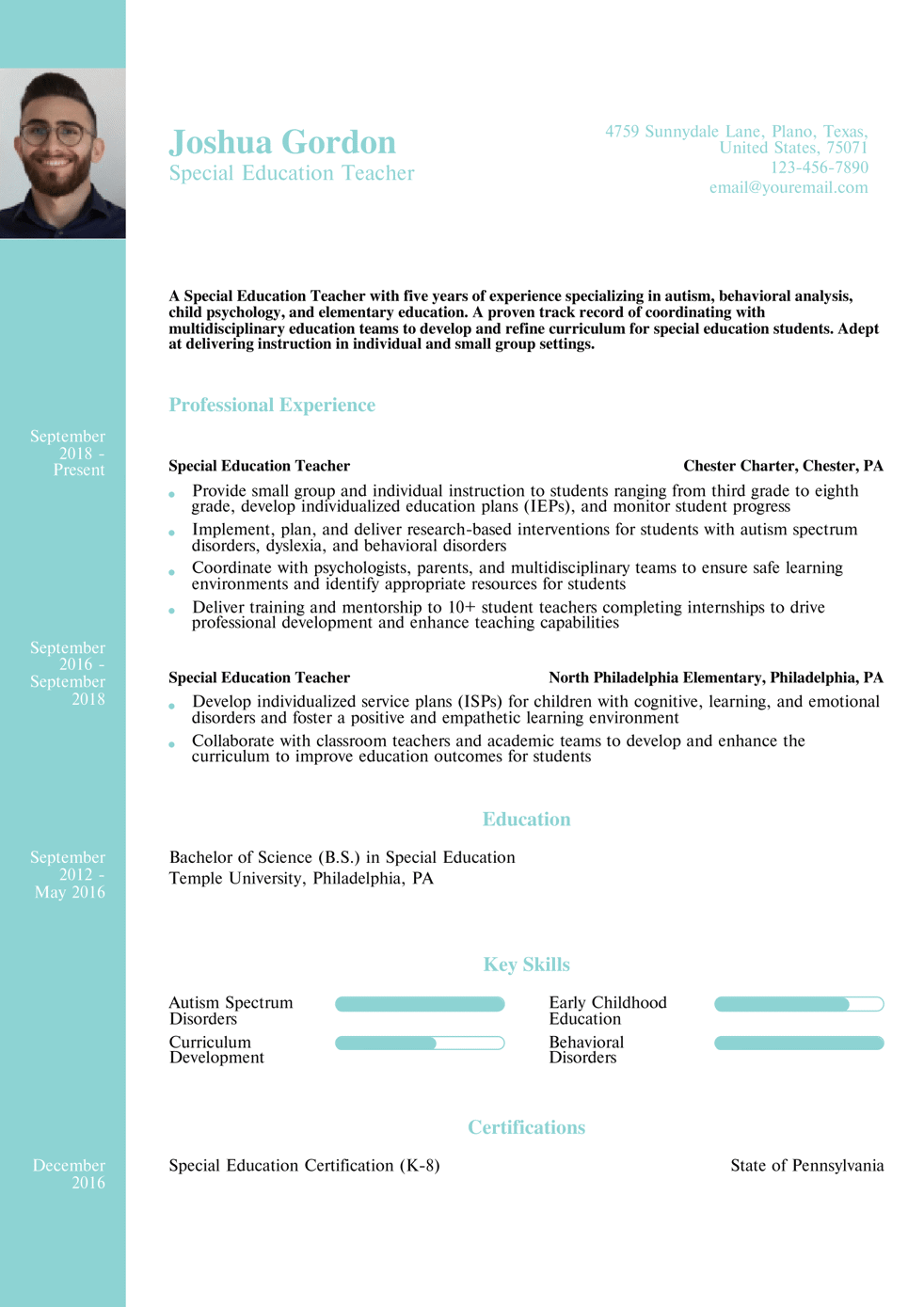
Why this special education teacher resume example is strong:
This resume stands out due to its focus on individualized education plans (IEPs) and personalized support for students with diverse needs. The candidate demonstrates a clear understanding of behavioral intervention and inclusive classroom practices, both essential in special education. The collaborative aspect of working with parents, therapists, and administrators further strengthens the resume, showing the candidate’s commitment to a holistic approach to student growth.
English Teacher Resume Example
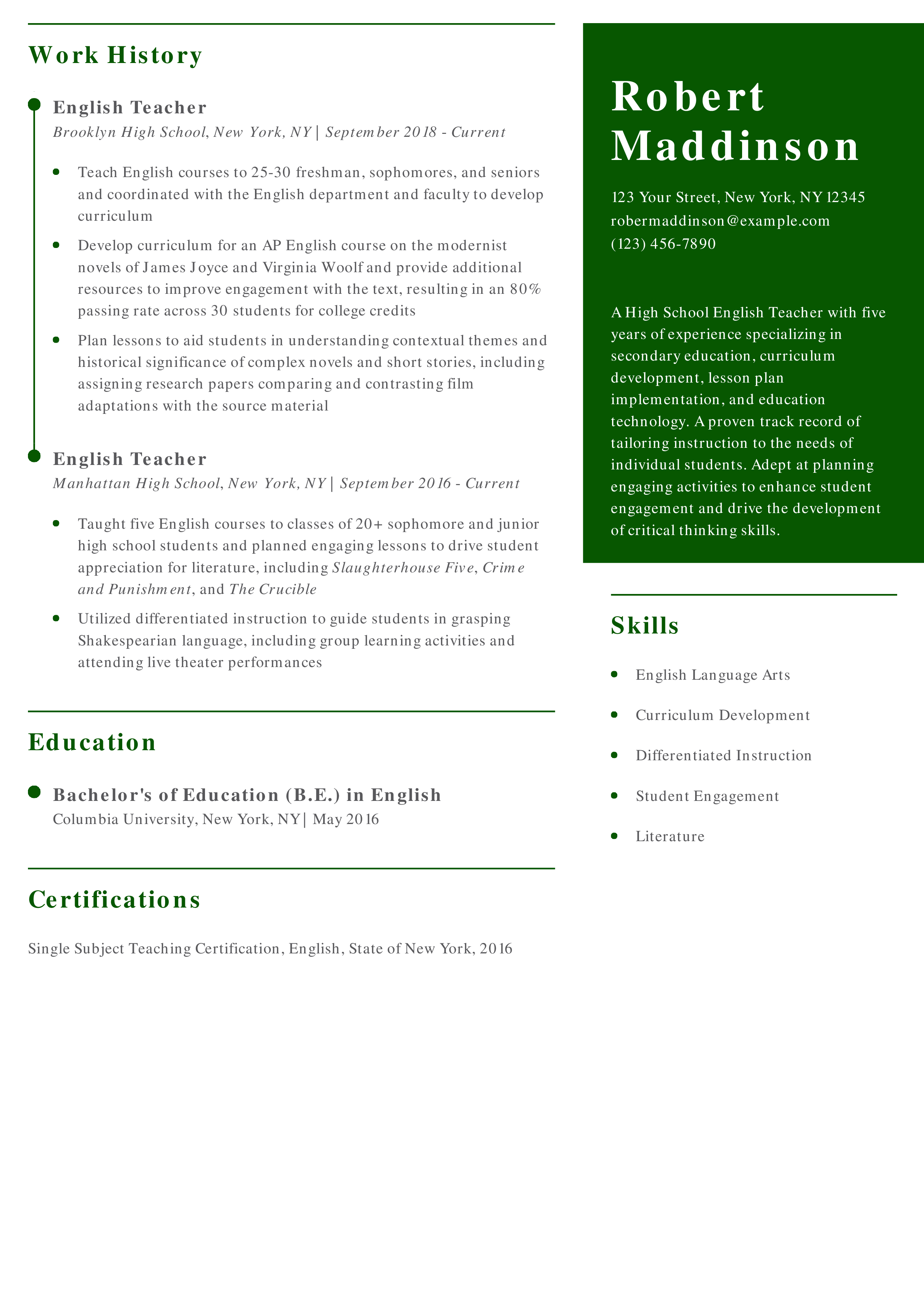
Why this English teacher resume example is strong:
The strength of this resume lies in the candidate’s ability to create engaging and creative lesson plans that foster a love for literature and writing. By incorporating technology and collaboration into assignments, the candidate has a measurable impact on students' writing skills, improving essay quality by 15%. The involvement in extracurricular activities, such as the writing club and literary magazine, demonstrates leadership and a dedication to student development beyond the classroom.
Our templates are crafted by professional resume writers to make creating your resume quick, easy, and effective.
- Professional resume template downloads
- Customized cover letter generation
- AI resume writing support
- Career-building resources and advice
Teacher Text-Only Resume Templates and Examples
How To Write a Teacher Resume
1. Write a dynamic profile summarizing your teacher qualifications
Your resume profile should catch hiring managers’ attention by summarizing your top strengths as a teacher in just two or three sentences. Brag about yourself a bit. Include some impressive facts, such as the number of years you’ve been in the education field or any industry recognition you’ve earned. Emphasize your experience teaching specific subjects and grade levels, or mention specialized programs and initiatives you were involved in that relate to your goals.
Senior-Level Profile Example
Resourceful elementary school teacher with nearly 10 years of experience inspiring and developing young minds. Adapt readily to new work challenges and conditions. Master of Educational Studies.
Entry-Level Profile Example
Art educator with strong recent work, volunteer, and academic experience. Passionate about engaging students in art theory and practice and helping young people explore their creative potential. Skilled at adapting instructional methods to each student’s learning style. Master of Arts in Teaching.
2. Add your teacher experience with compelling examples
The experience section is where you can give detailed examples of the impact you’ve made in the classroom. Focus on achievements that reflect the skills your target employers are looking for. Avoid writing a long list of duties and instead take a dynamic approach by quantifying your experience with numbers and percentages. For instance, you could give data on how you’ve helped raise test scores, increase graduation rates, or launch successful programs.
Senior-Level Professional Experience Example
Third Grade Teacher, Topeka School, Topeka, KS | August 2018 to present
[Well-regarded local elementary school with 300 students]
- Create and adapt lesson plans to students’ needs
- Prepare and deliver regular tests to classes of up to 25 students
- Write detailed quarterly reports on student progress for parents and school administrators
- Piloted a successful garden project to complement five key science unit objectives
Entry-Level Professional Experience Example
Student Teacher, Hollywood High School, Los Angeles, CA | February 2022 to March 2022
- Supported mentor teacher by preparing materials and answering student questions for art classes of up to 30
- Co-developed and executed dynamic and engaging lesson plans
- Integrated Photoshop, Illustrator, and other design software programs with traditional art education
3. Include your teaching education and certifications
Hiring managers want to see you have the education required to teach and engage with students effectively. List your education degrees to help establish your credibility and provide a clear picture of your knowledge base. Starting with your highest level of education, list the degree name, institution, location, and completion date.
You can further strengthen your resume by including relevant training and certifications. Whether it’s a teaching certificate, subject-specific endorsement, or specialized training in English as a Second Language (ESL) instruction, credentials show you’re committed to professional development. Format this section similarly, providing the certificate title, issuing organization, and date received.
Education
Template
- [Degree Name]
- [School Name], [City, State Abbreviation] | [Completion Year]
Example
- Master of Arts (MA) — Teaching
- University of Southern California Rossier School of Education, Los Angeles, CA | 2022 | 3.9 GPA
Certifications
Template
- [Certification Name], [Awarding Organization], [Completion Year]
Example
- California Professional Educator, State of California Commission on Teacher Credentialing, 2022
4. Include a list of your teaching skills and proficiencies
Including a key skills section on your resume highlights your mastery and can set you apart from other applicants. This section helps employers see how you manage a classroom, engage students, and contribute to the overall success of a school. Align your skills section with those in the job posting and present yourself as the candidate who meets the school’s needs. Here’s a list of skills you could use on your teacher resume:
| Key Skills and Proficiencies | |
|---|---|
| Classroom management | Complex problem-solving |
| Conflict management and resolution | Curriculum development |
| Differentiated learning | Emotional intelligence |
| Leadership | Learning assessment |
| Lesson planning | Multicultural awareness and sensitivity |
| Organizational skills | Parent and guardian relations |
| Public speaking and presentations | Reporting and documentation |
| Student engagement | Teamwork and collaboration |
| Technology integration | Test development and delivery |
| Time management | |
How To Pick the Best Teacher Resume Template
Before creating your resume, you need to choose a template. The best one for a teacher is clean and orderly, with a layout that highlights relevant achievements and skills. Select a professional template with plenty of white space for readability and visual appeal. Impress hiring managers with your background as an educator rather than distract them with decorative fonts or elaborate graphics.
Frequently Asked Questions: Teacher Resume Examples and Advice
What makes a Teacher CV stand out to recruiters?-
A Teacher CV stands out by clearly demonstrating your expertise and achievements in the field. Be sure to use measurable outcomes and include quantifiable results wherever possible. Show how your contributions directly impacted the company, whether it’s through cost savings, operational efficiency, or revenue growth. Keep the layout clean and easy to navigate, focusing on relevant experience.
What are common action verbs for teacher resumes?-
It can be hard to find the right words for your past teaching work. If you need more ways to describe your professional experience, we're here to help. Below is a list of common action verbs for educators to include on their resumes. Consider starting your bullet points with some of these dynamic words to convey your teaching contributions effectively:
| Action Verbs | |
|---|---|
| Advise | Analyze |
| Collaborate | Coordinate |
| Create | Deliver |
| Develop | Educate |
| Engage | Evaluate |
| Generate | Improve |
| Instruct | Lead |
| Listen | Manage |
| Mentor | Organize |
| Plan | Support |
How do you align your resume with a job posting?-
The job outlook for teachers from preschool to university is healthy, with a projected average growth of 9% over the next decade. By 2031, all these grade levels combined are expected to see more than 350,000 new jobs added to the workforce. Despite this growth, it’s still important to craft a resume that allows you to shine in a crowd of applicants.
If you have a specific teaching position in mind, you'll need to align your resume with the job posting. Take time to customize your resume by including relevant information that overlaps with the job requirements. Incorporate keywords and phrases from the job post throughout your resume to show you're the best candidate.
What is the best teacher resume format?-
In nearly all cases, use a Combination (or Hybrid) resume because it’s easiest for hiring managers to learn about your pertinent skills and experience – it’s also the simplest one to align with your job goals.
With the Combination format, you highlight your most relevant skills and experience in your experience or work history section, and an intro section. (This combination of work history and intro content is where the format gets its name.) Your resume intro should usually include a profile summary and key skills section, but you may also add a career highlights or awards section. By carefully choosing the details for these intro sections, you can position yourself for your target job and give hiring managers a clear, quick view of what you offer.
What’s the recommended length for a teacher resume?-
The recommended length for a teacher resume is one page, especially for professionals with under 10 years of experience. A two-page resume can work for those with substantial accomplishments or a longer career, but only if it’s concise and highly relevant to the role. Tailoring your resume to the job and highlighting your strongest qualifications are key to success.
Stick to listing work experience from the last 10 to 15 years, as this period is most relevant to employers. Summarize or omit older positions unless they’re crucial for your application. A focused and streamlined resume will help capture the hiring manager’s attention.
Craft your perfect resume in minutes
Get 2x more interviews with Resume Builder. Access Pro Plan features for a limited time!

Include a cover letter with your resume to increase your chances of an interview. The secret to an impactful cover letter is tailoring it to the position you’re applying for. Learn how to write an outstanding teacher cover letter with our comprehensive guide. Then, check out our elementary teacher and special education teacher cover letter guides for specific examples.
